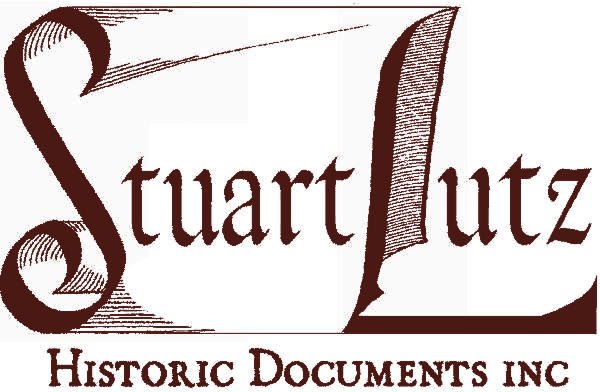| |
 (OCCUPIED JAPAN) (OCCUPIED JAPAN) |
|
|
|
|
| |
Price: $200.00 |
Stock# 5824 |
| |
A LETTER FROM OCCUPIED JAPAN JUST ONE MONTH AFTER V-J DAY DESCRIBING THE HARSH REALITY OF POST-SURRENDER JAPAN: “EVERY DAY THOUSANDS OF SMALL KIDS APPROACH YOU THEIR LITTLE HANDS STRETCHED OUT IN THE HOPE THAT YOU’LL GIVE THEM A PIECE OF CANDY”
(OCCUPIED JAPAN). ALS. 4 pages. 8” x 10 “. Osaka, Japan, October 8, 1945. An autograph letter signed “Van” to “Jane” describing the misery on the ground in Japan right after the end of the Second World War. Van is writing “Amidst a large crowd of Jap. civilians who have been begging me for some food, candy or cigarettes.” He later writes that “Japan so far has been nothing but misery and disease to me, along with big towns or small villages in complete ruins. So the people are living in the streets, under buildings, bridges, sleep under wrecked cars, busses, trolleys, etc. Every day thousands of small kids approach you their little hands stretched out in the hope that you’ll give them a piece of candy. Women unable to feed their babies, come up to you, with the little child sucking away on their breast, but not getting any milk at all. They beg for milk on their knees. Other women offer their gold wedding rings for a couple of C ration crackers. Disease is all over. Children with sores as big as a silver dollar all over their skinny bodies by the dozens. How the heck can you possibly refuse to give them a negative answer. This afternoon I actually couldn’t walk, because I was surrounded by women who kneeled down in front of me begging for food. I finally had to show them that they had no reason to be afraid of me, so I bent over, and put my hand underneath the chin of a young women, who was quite pretty. I lifted up her head and looked…The people here have no food at all, except for a few potatoes that they manage to grow in the streets or among the ruined buildings. They all carry huge sums of money, in the hope that some G.I. will sell them a can of C-rations or a K-ration, which they will pay for with as much as 500 yen ($30.00) of course it is strictly {sic} forbidden. But some guys get away with it and are making a fortune at the present”. After a few concluding thoughts and sending “Loads of Love”, Van writes a postscript saying he expects to be home by Easter. Pages are numbered at the top. The collection is missing the third and fourth pages and contains a noticeable horizontal crease across the middle of the pages but is in otherwise very good condition. |
5824
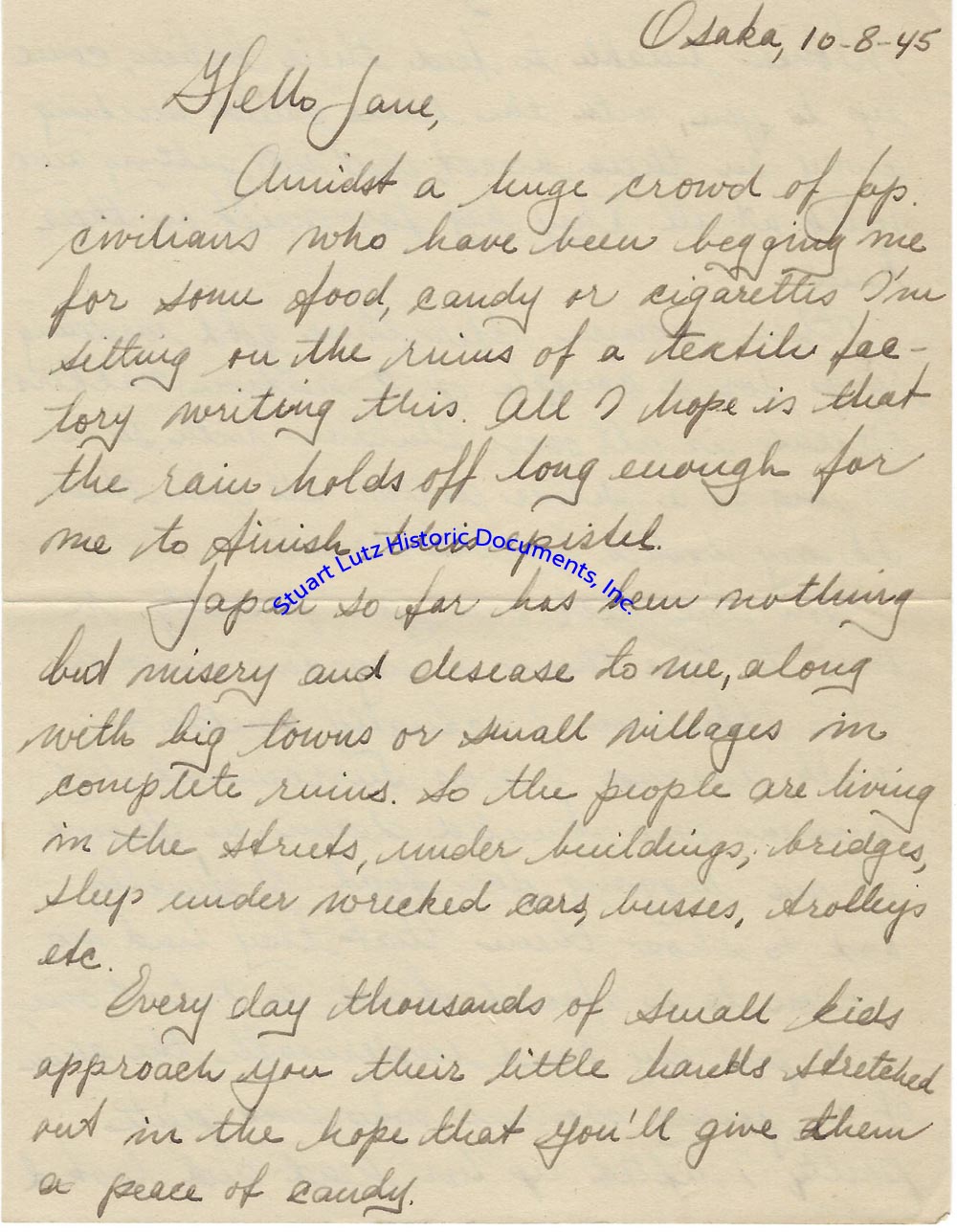
|
|
| |
| |
 (THE FLYING TIGERS) (THE FLYING TIGERS) |
|
|
|
|
| |
Price: $500.00 |
Stock# 6281 |
| |
A CHINESE MENU SIGNED BY A NUMBER OF FLYING TIGERS, INCLUDING THE FAMOUS TEX HILL
THE FLYING TIGERS. The Flying Tigers were a volunteer group of American aviators that flew in China to oppose the Japanese invasion. It was organized and headed by Claire Chennault.
Signed menu. 9” x 12”. No date [probably early 1940s]. Chicago. A program from Chicago’s Bamboo Inn signed by a number of Flying Tigers. The approximately dozen autographs were given to Carmen Morales, an actress and exotic dancer from the 1930s, and the men signed on the first and last pages of the menu. Some of the signers include Hugh Hutchinson (later President of the 14th Air Force Association), Major General Charles B. Stone, Tex Hill (a triple flying ace credited with 12 ¼ victories), Floyd Finberg and others. Some of the autographs are in Chinese (I cannot decipher) and a few are in pencil. The overall condition is very good. |
6281
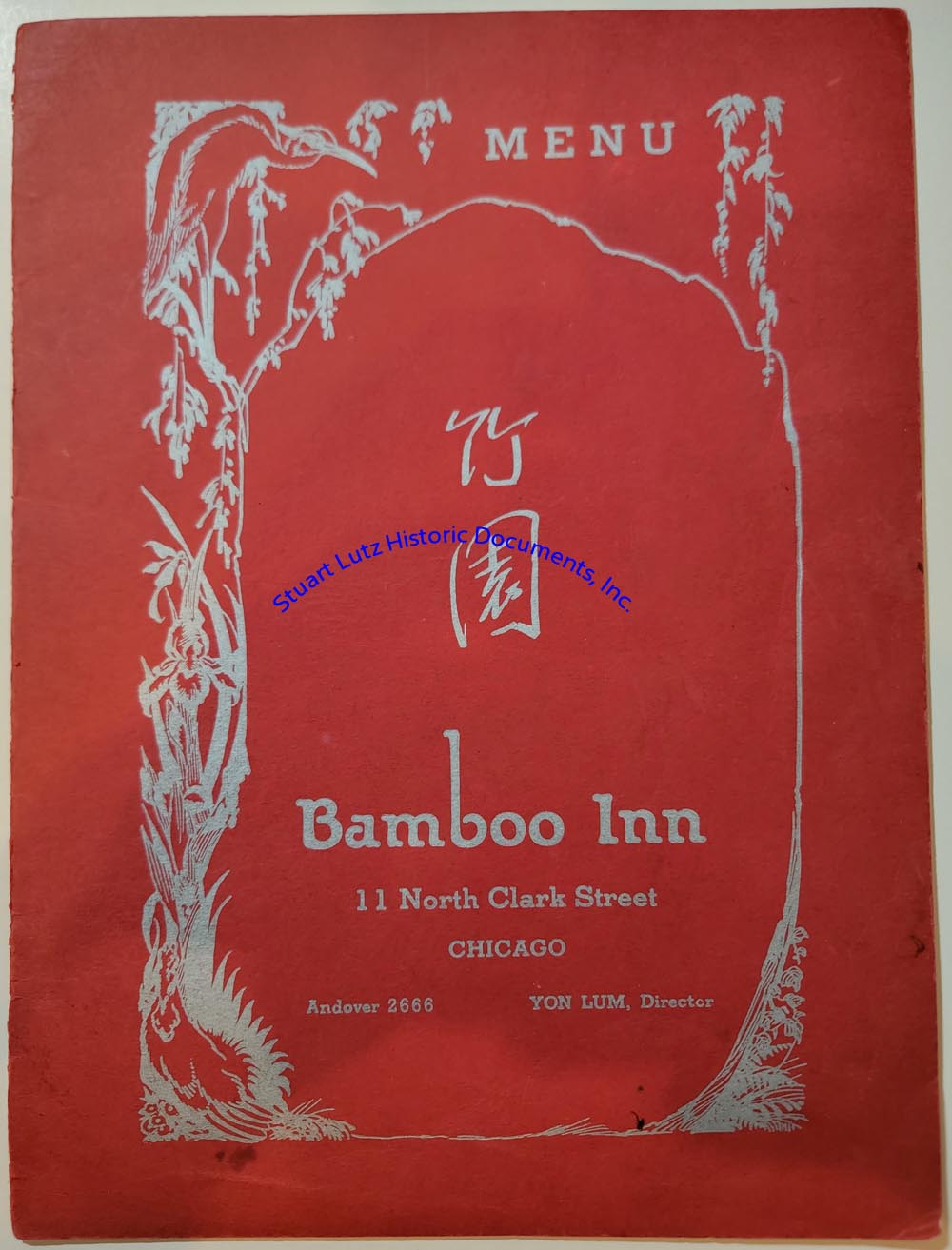
|
|
| |
| |
 (THOMAS HARRIGAN - WORLD WAR II) (THOMAS HARRIGAN - WORLD WAR II) |
|
|
|
|
| |
Price: $500.00 |
Stock# 6079 |
| |
PHOTO ALBUMS OF THOMAS LOGAN HARRIGAN, U.S. SOLDIER DURING WORLD WAR II, INCLUDING HIS TIME SPENT IN NORTHERN IRELAND, LOUISIANA, AND WASHINGTON D.C.
(WORLD WAR II). This archive consists of three photo albums created by Thomas Logan Harrigan (1913-1988). Harrigan was a United States Army officer during World War II, rising to the rank of Lieutenant Colonel. Each photo album is leather-bound, with his signature on the front along with “World War II,” the volume number, and the dates corresponding to the photographs inside.
Volume I covers April 29, 1942 to December 1, 1942, and highlights Harrigan’s time in “Ireland”. Harrigan was actually stationed and resided in Northern Ireland, as Northern Ireland was a part of the United Kingdom while the Republic of Ireland controversially remained neutral during the war. Photographs include Newcastle, Belfast, Camp Girdwood, Queens University -Belfast, and the first P-38 plane unloaded in Northern Ireland. Belfast was a key industrial city in the United Kingdom's war effort, producing ships, tanks, aircraft, and munitions.
Volume II covers December 1942 to March 1943, and highlights Harrigan’s continued service in Northern Ireland. However, this album also includes photographs from outside the specified time range. It was also during this span that Hannigan received his promotion to Lieutenant Colonel. By 1944, Harrigan had been transferred to Louisiana or was on leave there, so photographs show him attending an LSU football game and doing some sightseeing in New Orleans. Additionally, though not pasted into the album, there are additional photographs in this volume of his wife and their young family, as well as official U.S. Army photographs from after the war, including of a 1958 July 4th celebration and a 1962 Yokohama Area Community Relations Advisory Council meeting.
Volume III, dated 22 March 1944, highlights the timeframe in which Hannigan was stationed in Washington D.C. Photographs include of sightseeing, his office in the Pentagon, the 1945 Army-Navy game, and when “Gen. Eisenhower comes home”. There are additional family photographs of good times during the last stages of the war and later in 1945.
All photographs are from film cameras and printed on cardstock. They are all in black-and-white. The photographs are in fine condition. The albums themselves are a bit worn, and the binding is loose on Volume III. It is only held together by the rope that connects the album’s pages. Regardless, this album is a riveting, holistic view of a mid-level United States Army soldier during the years of the Second World War. |
6079
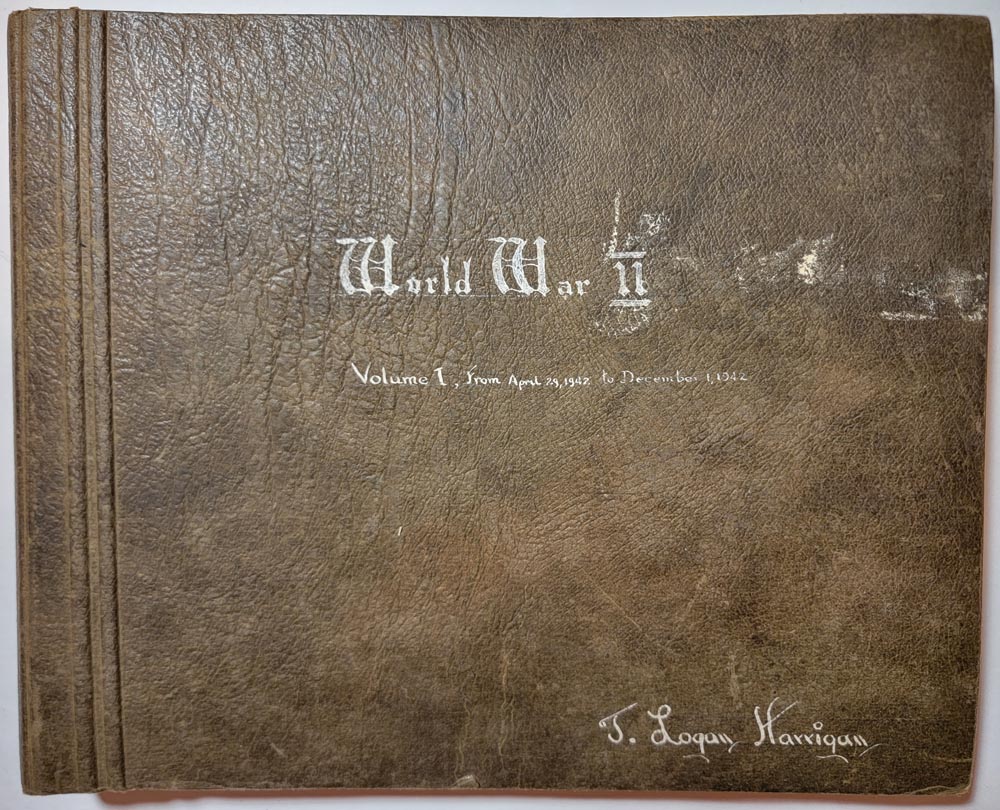
|
|
| |
| |
 (WORLD WAR I IN EUROPE LETTER) (WORLD WAR I IN EUROPE LETTER) |
|
|
|
|
| |
Price: $300.00 |
Stock# 4314 |
| |
AN AMERICAN LIVING IN VIENNA EXPERIENCES THE BEGINNING OF WORLD WAR ONE – “…WE ARE STILL IN NO DANGER AS LONG AS WE STAY HERE… EVERY AVAILABLE PLACE IS FILLED WITH WOUNDED SOLDIERS… MANY AMERICANS WENT HOME WHEN YOUR LETTER WENT”
(WORLD WAR I). ALS. 3pgs. November 13, 1914. Vienna. An autograph letter signed “Libbie Tappan” by an American living in Vienna at the start of World War One. Tappan writes home to her sister in America concerning wartime conditions in Vienna. She mentions lies of the media and the fear that her letter will be censored: “My Dear Sister: I wrote you a letter, sent 21 by a lady who was going home to America. She would amil it in New York. Irene sent one to her Mother, she has received an answer to hers. SO I am wondering why I don’t hear from you At that time every thing was excitement. All mails from here was stopped and now we have to leave our letters open. Irene’s Mother wrote her to come home at once but we thought it was to big a risk to run. We had no idea that they were writing all lies until we got hold of an American paper. War was first declared here on account of the to be next king and his wife were killed by the Serbians. There is such a lot to tell but for fear it will never reach you I will only say the German Kaiser is not to blame. The Germans and Austrian Hungarians have never lost a battle we are not starving and there is no…here. All places of amusement were closed trotting was stopped, the first of August. Things are beginning to brighten a bit now, but there will be no racing until next year. Every available place is filled with wounded soldiers and we don’t see much else but soldiers although there has never been a battle here in Vienna. I am so sorry about Marvin. It seems too bad he had to be taken. I hope you let Eugene and the rest of the folks know about us. We are still in no danger as long as we stay here. I am so sorry I cannot send you some money but it is impossible now. But just as soon as it can be sent will send. Remember me to all the ladies? There was a call for linen for the wounded. Irene did two pounds out of my old linen. I thought of you all how busy you would be if you was here, there was a ship load of red cross nurses and doctors come over some of them are here in Vienna. There were many Americans went home when your letter went. They were nearly a month on the way. I suppose it cost them a small fortune to go I don’t think of any thing else just now. Will write soon again. Trust you are well, and all the ladies also. Berdette & Irene sends love Ever your loving sister Libbie Tappan”. An interesting first-hand account. It is in very good condition and the original envelope is enclosed. |
4314
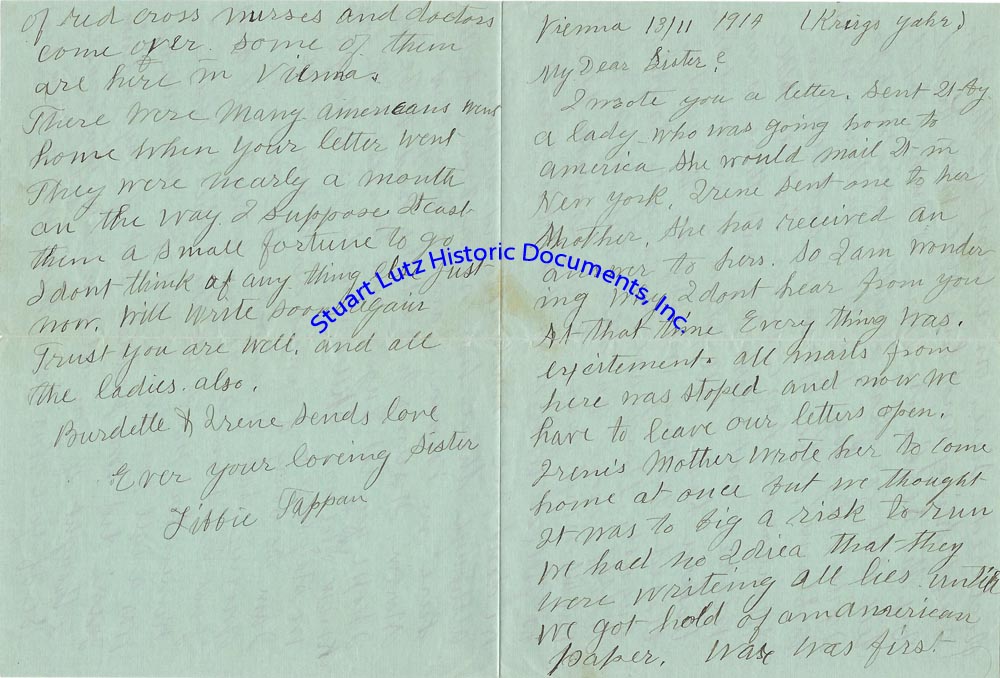
|
|
| |
| |
 (WORLD WAR I) (WORLD WAR I) |
|
|
|
|
| |
Price: $100.00 |
Stock# 3650 |
| |
AN AMERICAN SOLDIER WRITES HOME WHILE RECOVERING IN PARIS DURING WORLD WAR I
(WORLD WAR I). ALS. 4pgs. 4 ¼” x 5 ½”. Paris. October 11, 1918. An autograph letter signed “Jim” by an American soldier in Paris near the end of World War I. He was recovering from minor wounds and a surgery at an American Red Cross hospital in Paris. The letter is on “American Red Cross” stationery. “Dear John: -- Well here I am back in Paris again but under much different circumstances. When I was here before I just happened to be going there the town was stopped over for a couple of days, I joined my regiment a few days late and the day I caught up with a jab of anti-tetanus serum my wounds being slight and permitting travel I was sent along to this place which is an American Hospital for officers with American Red Cross nurses and every one here gets the best of care, When I landed here they took x-ray pictures of my wounds and next came the operation they gave me ether or gas I know not which and way I went to sleep on the table about 2.45 P.M. and remembered nothing until a nurse spoke in my ear about 5.00 P.M. saying, how do you feel now? This letter contains nothing but truth so don’t worry. We went into the fight and let me tell you it was some hot place for a few days, must say this upon war-fare with with the…and his men guard M.S. auction is not stuff I as…was very lucky and came out of it with two small wounds one on my right leg about which your pocket (bottom of) would come and the other on the top of my right foot, this left me so that I was unable to walk so I was given first aid and sent bank in an ambulance to a hospital where the gave me I was not sick at all and I am feeling fine now they have not taken the stitches out yet, however I will be walking in a few days. I trust every thing is going well with you and those at the club, my mail is holding so I am somewhat…on some news. Will close with best wishes to all from Jim S.P. #179 R.d.U.S. Please excuse writing it, as I am sitting up in bed. J”. The letter is in fine condition. |
3650
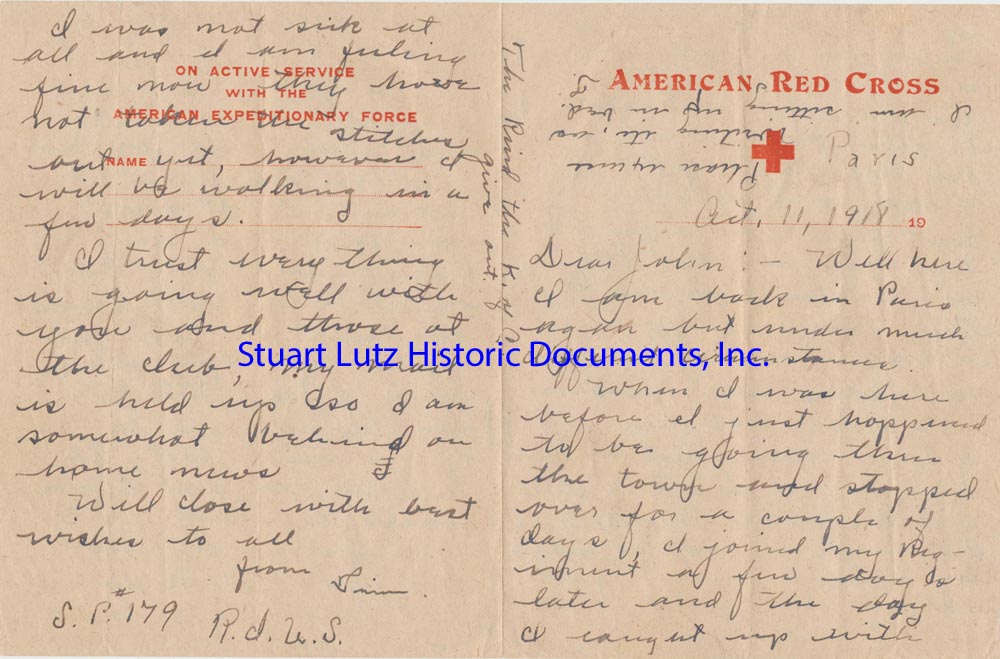
|
|
| |
| |
 (WORLD WAR II ARCHIVE) (WORLD WAR II ARCHIVE) |
|
|
|
|
| |
Price: $4,000.00 |
Stock# 5396 |
| |
THE ARCHIVE OF MEYER J. FRECHIE, THE JEWISH AMERICAN ARMY OFFICER WHO ORGANIZED COVERT ALLIED TRANSPORTATION TO NORMANDY FOR D-DAY
MEYER J. FRECHIE (1907-1988). An American Army Lieutenant Colonel in World War Two, Frechie was Chief of the Operational Branch of the Transportation Office and was responsible for coordinating the transportation logistics of the Normandy Invasion (D-Day).
Archive. More than 1,600 pieces. 1942-1953. The archive of Lieutenant Colonel (later Colonel) Meyer J. Frechie. The archive primarily dates from 1942 to 1945. It includes letters to and from his family in Philadelphia, including his wife, young son, parents, and sister, and military papers, including some interesting material directly related to his work in Allied transportation.
Frechie, a graduate of the Wharton School of Business at the University of Pennsylvania, worked as a traffic manager for the railroad and steamship industries before the war. After the United States’s entry into World War Two, the military actively courted Frechie for his skill in transportation logistics. He joined the war effort as a civilian traffic manager for the Army in 1941 before officially joining the Army at the rank of Captain in February 1942 and being sent to London. There, he was put in charge of coordinating the covert transport of Allied servicemen and supplies from England to Normandy for D-Day. According to the lengthy text accompanying his citation for the Legion of Merit, Frechie’s war-time activities were, in part, as follows:
“The Operational Branch, Movements Division, Office of the Chief of Transportation, was activated in August 1943. Lt. Col. Frechie, being the only officer available with amphibious operational experience, was designated Chief of said Branch. He developed his staff by sending his officers and men thru a series of strenuous exercises with the British and American Forces at various places in the United Kingdom in preparation for D-Day…Lt. Col. Frechie, as Chief of the Operational Branch, was responsible for the movement of all troops, vehicles, equipment and supplies for movement ‘OVERLORD’. From D-Day to 7 September 1944 a total of 1,302,954 personnel, 260,433 vehicles, and 1,272,532 deadweight tons of supplies have been shipped from the United Kingdom ports to the Continent. The entire ‘OVERLORD’ movement program was executed by the movement instructions issued by the Operational Branch…Lt. Col. Frechie arranged for the building of scale models of various landing craft and scale wood blocks of various general purpose and special purpose vehicles to be used in movement ‘OVERLORD’…Participating in actual exercises where one or more of the plans were tested by actual execution, Lt. Col. Frechie analysed the results and proceeded t make final plans for movement to implement Army requirements. Lectures were made to the Air Force and Ground Services outlining movement plans; ports and depots were visited and careful studies made of their capacity to handle the vast quantity of supplies, vehicles and personnel necessary to sustain the operation. Many obstacles were confronted and surmounted by Lt. Col. Frechie in perfection of operation ‘OVERLORD’…This required the greatest flexibility in operation which the Operational Branch, under Lt. Col. Frechie, was able to exert with dispatch…At all times, Lt. Col. Frechie’s superior judgment, keen foresight, expert planning and unselfish devotion to duty, maintained an exceedingly high state of morale among the officers and men associated with him, and his efforts can be directly attributed to the prolonged success of this vitally important mission of the Transportation Corps.”
Frechie was discharged from active duty in November 1945 and served in the Army Reserves until 1953. He was promoted to Colonel in 1946.
The archive contains two large boxes and three small boxes of letters and documents. All are in at least good condition, with the exception of a few torn letters. Highlights are as follows:
- One large box of military paperwork. The highlight is a book entitled “Berth Allocation Ports UK” and marked “Most Secret” on the cover; it examines many British ports and their capacity in preparation for the D-Day Landings. It includes a booklet of secret maps and information about ports in the United Kingdom. There is also a thick file of diverse paperwork relating to Frechie’s military career (a mix of originals and copies, some of it quite mundane, such as records of his travel within the UK), booklets written by Frechie, including Preliminary Analysis and Recommendations Cargo Documentation Procedure and Historical Critique of the United Kingdom Overlord Movements (three copies), certificates of appointment as Lieutenant Colonel and Colonel, copies of his Honorable Discharge, citations for the Bronze Star and Legion of Merit, and a thick file of documents relating directly to his work on the Normandy landings. Much of the most interesting and unique material can be found in this box. The two thick files are hundreds of pages each.
- One large box of hand-written letters and copies of V-Mail to and from Frechie’s wife, Rita, and son, Allen. There are 659 letters from Frechie to Rita and Allen, including many duplicates. They are dated 1942-1945 and 1947, and there are also numerous letters dated only with the month and day. The greatest number are dated late 1942 and 1943, when he wrote multi-page letters to her every day, often more than once per day. There are also 230 letters to Frechie from his wife and son, the majority dating to 1942. This is the bulk of the archive, both in number of unique items and in quantity of pages.
- One small box of hand-written letters and copies of V-Mail to (144) and from (246) Frechie’s parents, Bessye and Jack. There are numerous copies of V-Mail from Frechie’s mother, including some duplicates.
- One small box of hand-written letters and copies of V-Mail to (43) and from (206) Frechie’s sister Fleurette Lang, brother-in-law Stanley, and niece Jackie. The majority is copies of V-Mail letters from Fleurette.
- One small box of miscellaneous cards, newspaper clippings, assorted Army-related pamphlets, etc.
This is the substantial archive of a man who made a unique and valuable contribution to the Allied victory in World War Two. |
5396
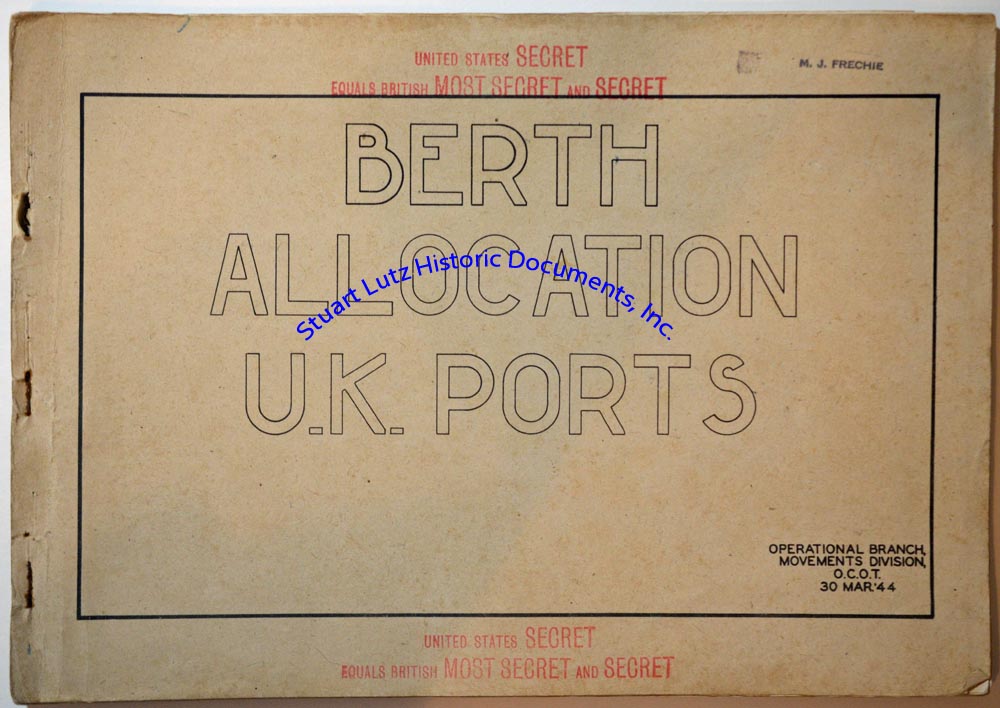
|
|
| |
| |
<Next 6>
|
 |
